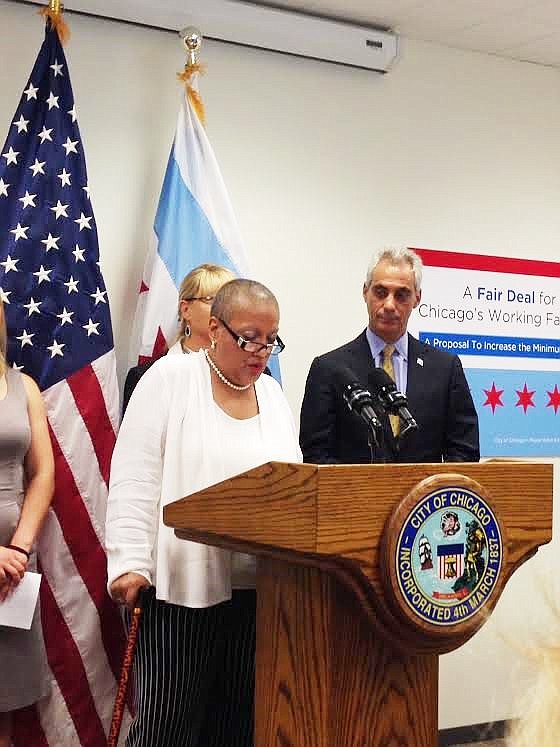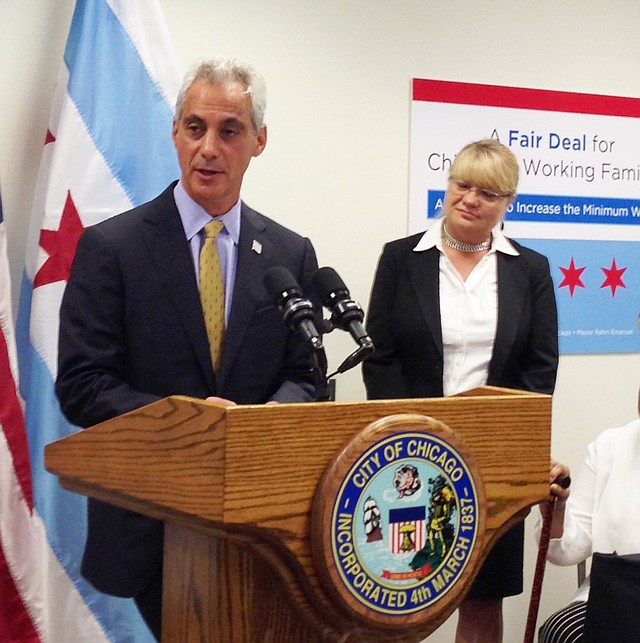Mayor Emanuel Signs Executive Order to Raise Minimum Wage for Contractors
Last week at a press conference, held at 33 W. Monroe St., Chicago Mayor Rahm Emanuel signed an Executive Order requiring City contractors and subcontractors to pay employees a $13 per hour minimum wage of for contracts advertised after October 1, 2014.
“A higher minimum wage is essential to putting a financial floor beneath our hard-working families,” said Chicago Mayor Rahm Emanuel. “With this Executive action, we’ll help ensure that nobody who is contracted to do work with the City of Chicago will ever have to raise their children in poverty.”
The Executive Order applies to all service contracts, including construction contracts, advertised after October 1, 2014. The hourly wage will be indexed to inflation and will increase proportionally on a yearly basis thereafter.
Approximately 1,000 contracted employees will benefit from the Executive Order. These workers are typically employed as landscapers, maintenance workers, security officers, concessionaires, and in custodial services.
“We made the decision long ago to pay our employees a decent wage that enables them to support their families,” said Deborah Sawyer, President and CEO, Environmental Design International, who spoke alongside Mayor Emanuel during the press conference. “Raising the minimum wage is not only good for my employees, but helps reduce worker turnover and improves workplace morale – which helps my bottom line as a small business owner.”
Founded in 1991, Environmental Design International, Inc. (EDI) is an MBE/WBE/DBE certified professional engineering firm headquartered in Chicago that, according to Sawyer, is a primary contractor.
“One thing that I’m grateful is that [the Executive Order] will level the playing field because we [at EDI] have always paid above minimum wage and sometimes it makes us not attractive for contracts because there are people paying a lot less to their staff and provide no health insurance,” said Sawyer.
Sawyer added that the ability for businesses, both large and small, to be able to provide health care insurance for to their employees would further level the playing field for all several companies.
When asked by the Chicago Citizen Newspaper as to why the minimum wage Executive was $13 an hour instead of $15 an hour, as proposed by several local and national minimum wage increase advocates, Mayor Emanuel referenced the Minimum Wage Working Group’s recommendation of $13 as a “living” minimum wage for the City of Chicago.
The Minimum Wage Working Group was a collection of elected, business, labor, and advocacy officials appointed by Mayor Emanuel to assess whether or not the minimum wage in Chicago should be increased. On July 8, The Minimum Wage Working Group submitted a final report to the Mayor’s Office recommending that the minimum wage in the City should be increased. On July 30, an ordinance was introduced to City Council by the Mayor and over 20 aldermen to increase the minimum wage to $13 by 2018 which would raise wages for approximately 410,000 workers, nearly 31 percent of the Chicago workforce, and add $800 million to the local Chicago economy over four years.
“The City can lead by example by ensuring that our contractors are paying a higher minimum wage to employees that work on City projects," said 4th Ward Alderman Will Burns, Co-Chair of the Minimum Wage Working Group, “This order represents another step towards our goal of a $13 minimum wage for Chicago workers, which will boost the incomes for 400,000 workers and lift 80,000 residents out of poverty."
As chairman of the Democratic Congressional Campaign Committee during the 2006 elections, then-Congressman Emanuel made a federal minimum wage increase part of the Democrats’ “100-hour Plan” of legislation to be enacted within the first 100 hours of a Democratic Congress. As Democratic Caucus Chairman in the 110th Congress, Mayor Emanuel worked with Speaker Nancy Pelosi to pass the Fair Minimum Wage Act of 2007 out of the House within the first week of the new Democratic majority. This bill increased the minimum wage by 40 percent, from $5.15 to $7.25 an hour, the first increase in more than a decade.
For more information visit http://www.cityofchicago.org/city/en.html.
Latest Stories
- CREATE Program Partners Celebrate their Education Commitment’s 5th Year with over $700,000 in STEM Contributions to Southside Schools and Educational Institutions
- Sprite Reimagines the Legendary Obey Your Thirst Campaign with Modern Icons Anthony Edwards and Sha'Carri Richardson
- Pink Noire Beauty Supply & Cosmetics Celebrates Second Anniversary with Release of New Braid and Loc Gel
- Prosperity Now Announces the RISE Challenge to Inspire Innovation and Economic Empowerment
- Oakwood University Crowned the 35th Honda Campus All-Star Challenge National Champion
- Mayfestiversary Returns Memorial Day Weekend 2024
- Culver’s Offers Single Scoop of Fresh Frozen Custard for $1 Donation to Local Agriculture Education Initiatives on May 2
- Jiménez Opens Up Resources for Organizations Combating Homelessness
- Governor Pritzker Celebrates Innovafeed Production Facility and Headquarters Opening in Decatur
- CHICAGO TRIATHLON ADDS SUPERTRI PRO LEAGUE EVENT TO WEEKEND ROSTER THIS AUGUST
Latest Podcast
This Is Life



